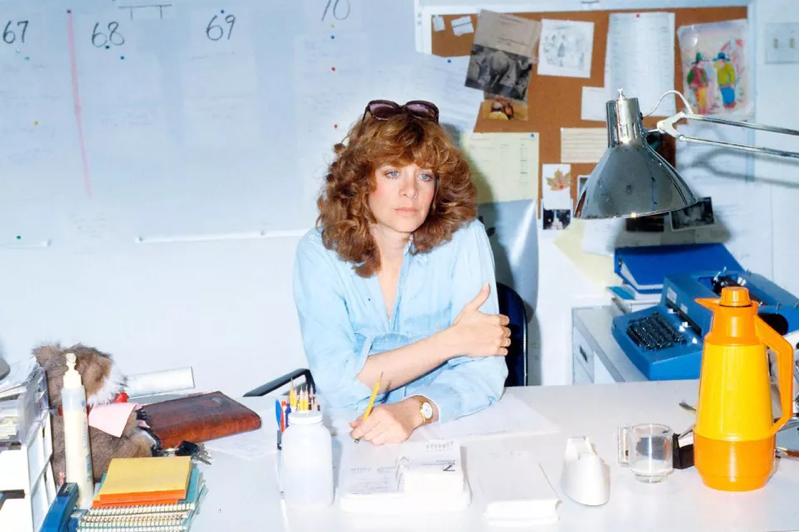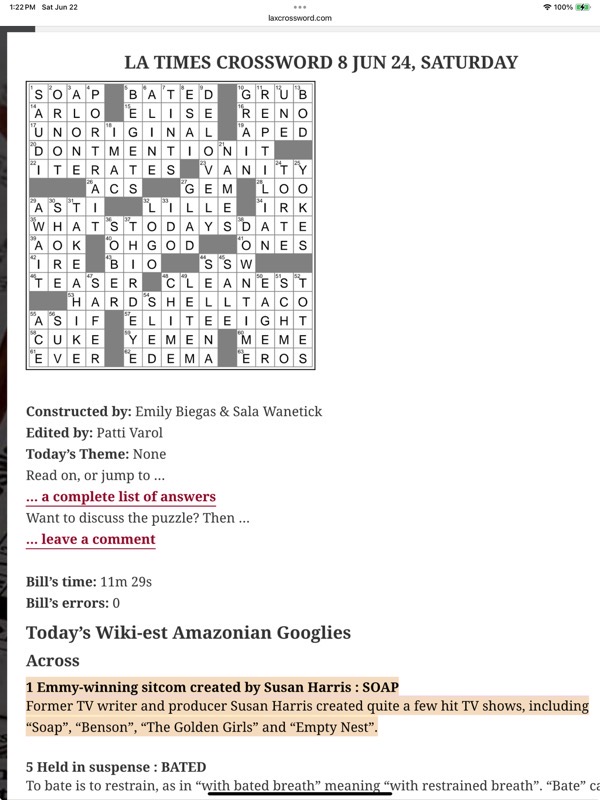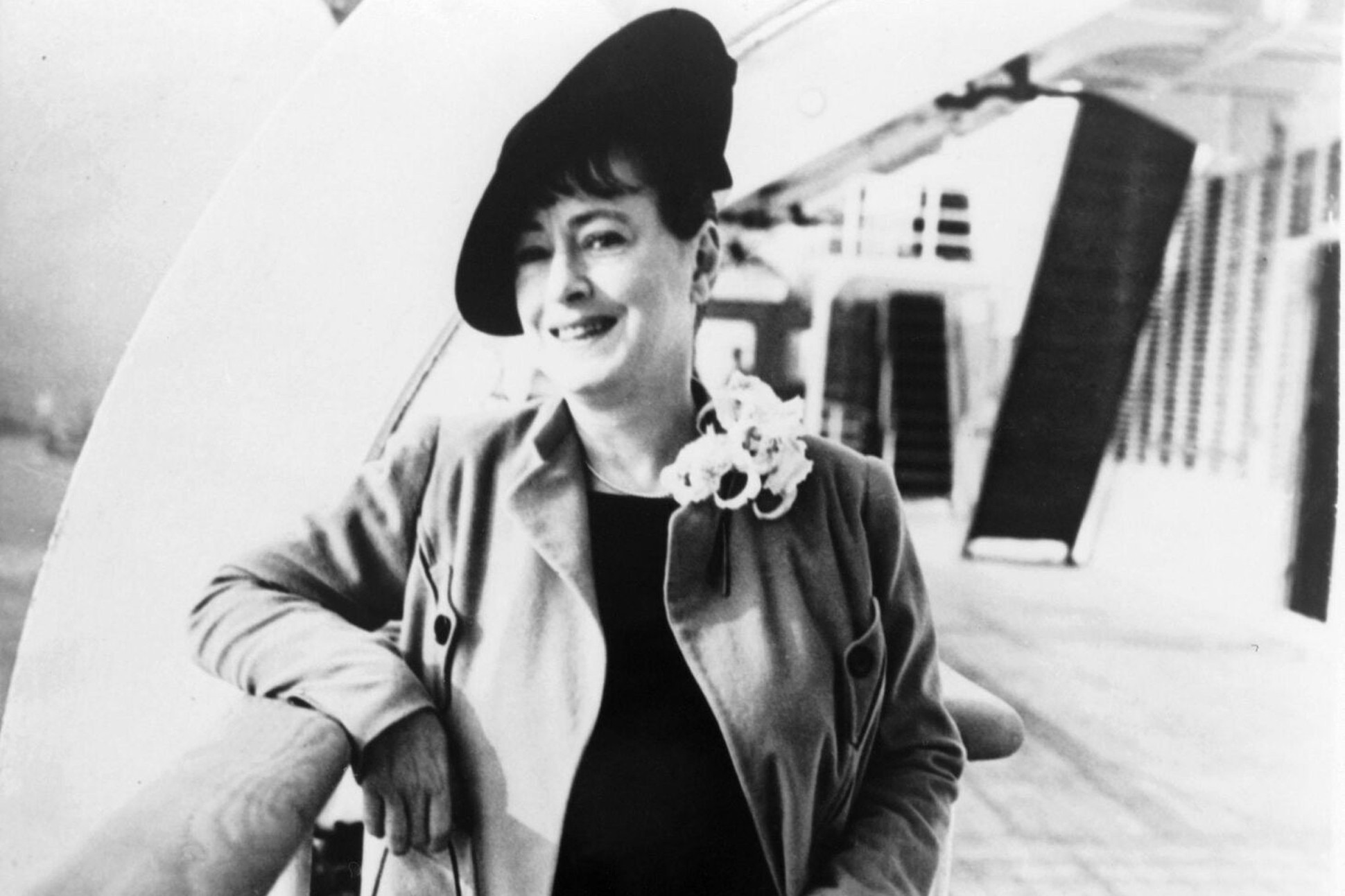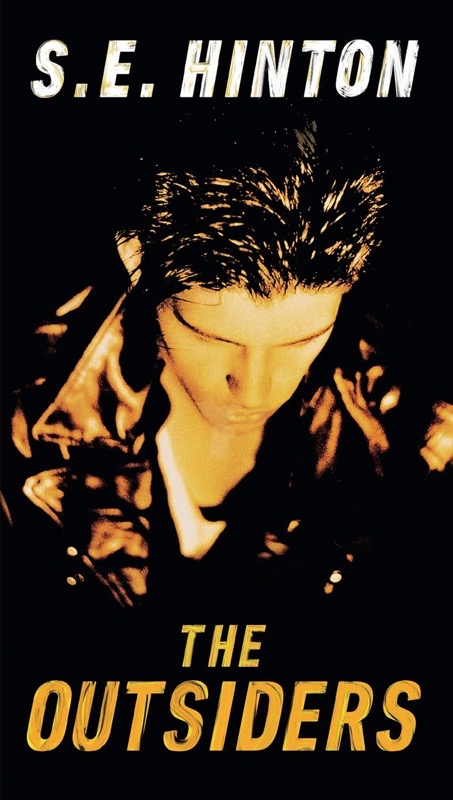Read Adapting Classic Novels Not the Only Tool in her Kit: Silent Screenwriter Dorothy Farnum
Read about more women from early Hollywood
Podcast: Play in new window | Download
Subscribe: RSS
On Screenwriting and Media with Dr. Rosanne Welch
Writing, Film, Television and More!

Susan Harris wrote her first freelance TV show in 1970, wrote for All in the Family and Maude from 1971-1973, premiered SOAP in 1977, followed it up with the spinoff of Benson in 1979, and The Golden Girls ran from 85-92. Though she retired in the early aughts her “Girls” have since been re-envisioned for audiences in Holland, Greece, and Chile.
How many years AFTER her last hit show went off the air and she – the writer – is known for those shows — not the many journeymen directors who came and went – so much so that in June 2024 June 8 to be exact) the Los Angeles Times Daily Crossword puzzle included this question: 1 Across, 4 letters: “Emmy-winning sitcome created by Susan Harris.” Answer: “SOAP.” The explanation: “Former TV writer and producer Susan Harris created quite a few hit TV shows, including “Soap”, “Benson”, “The Golden Girls” and “Empty Nest”.

THAT is how writers should be written about (especially by other writers) and why I’m editing a book of essays/chapters on The Works of Susan Harris!

I was doing editor rewrites on a chapter titled “Dorothy Parker: The Creative Genius Behind Film Franchise A STAR IS BORN.” To the note asking me to consider a “less hagiographic title,” I said “No”.
A quick check showed me that many, many, many male writers are called geniuses – but few women.
For instance, this article, Genius – still a country for white, middle class, heterosexual men*, notes:
“Try a quick google search of the terms “literary genius”. The same names keep appearing: William Shakespeare, Fyodor Dostoyevsky, Henry James, William Chaucer, Virginia Woolf, Ernest Hemingway, Herman Melville, Walt Whitman, Jane Austen, Mark Twain, J.D. Salinger, and so on.”
But I would object to J.D. Salinger. Catcher in the Rye did not move me at all – but S. E.  (Susan Elizabeth) Hinton’s The Outsiders moved me and all the generations from mine through my son’s Millennial group and into the folks watching the musical on Broadway right now – while teaching us all to love the poetry of another male genius – Robert Frost. See, I’m willing to use the adjective on men when they deserve it.
(Susan Elizabeth) Hinton’s The Outsiders moved me and all the generations from mine through my son’s Millennial group and into the folks watching the musical on Broadway right now – while teaching us all to love the poetry of another male genius – Robert Frost. See, I’m willing to use the adjective on men when they deserve it.
So the lesson of the day is that if any writer deserves to be called genius, it’s Dorothy Parker.
Own your genius. And use it to describe other female creatives. And maybe refrain from using it on less men for once.
* Genius – still a country for white, middle class, heterosexual men, Natalie Kon-yu, The Conversation
I was introduced to historian Drew Gilpin Faust’s books in my PhD program and learned so much (about writing, women’s involvement in the Civil War, and cultural shifts) from her This Republic of Suffering: Death and the American Civil War…

…that I was excited to read her new autobiography, Necessary Trouble: Growing Up at Midcentury
As expected, I learned so much – she was born in Virginia to (sadly) racist parents but chose Northern schools to teach herself the opposite of their ways – ended up at the march in Selma and became friends with John Lewis — the book title comes from his famous phrase which she asked his permission to use.
My Mom always said you learn more from autobiographies than from fictional books. Though I still read copious amounts of both kinds, she was right in that the real-life details I’ve collected from autobiographies have stayed in my mind longer than much of my other reading.
And if you don’t know the story of how Gilpin Faust became the first female president of Harvard University – check it out:
Drew Gilpin Faust, the First Female Harvard President, Was Nicknamed ‘Chainsaw Drew’
Essentially, previous president Lawrence H. Summers was forced out for saying that “intrinsic” gender differences accounted for the lack of women in science (in other words there weren’t a lot of women in science and math departments because ‘girls aren’t good at math’) so they appointed Faust the immediate interim pres while they looked for a new one – and after 18 months of looking it suddenly occurred to them that she’d been doing the job for… 18 months so why not make her the permanent new pres? She held the gig for 11 years and “generated what might be considered the opposite kind of controversy: She was too PC, her critics griped — during her time, the number of tenured female faculty rose by 47 percent.”